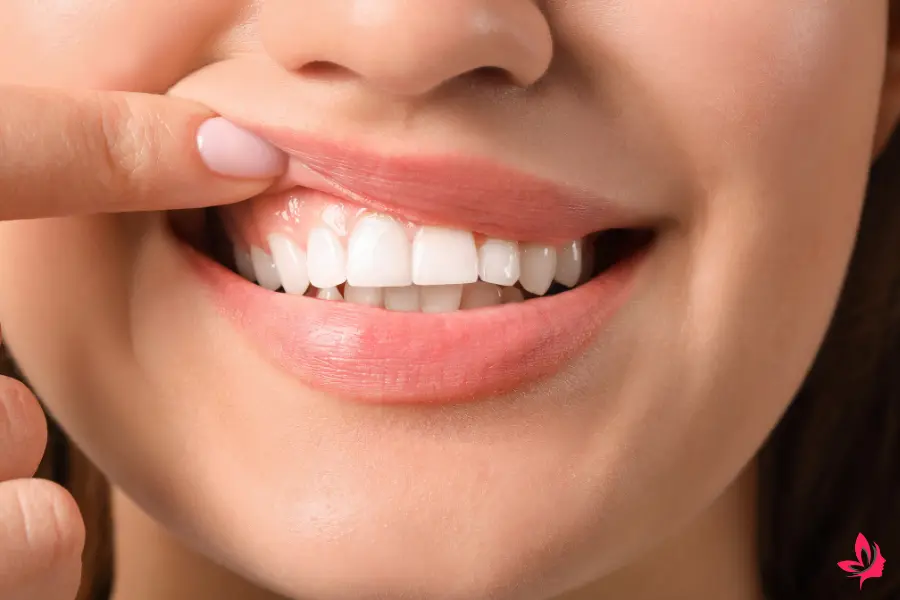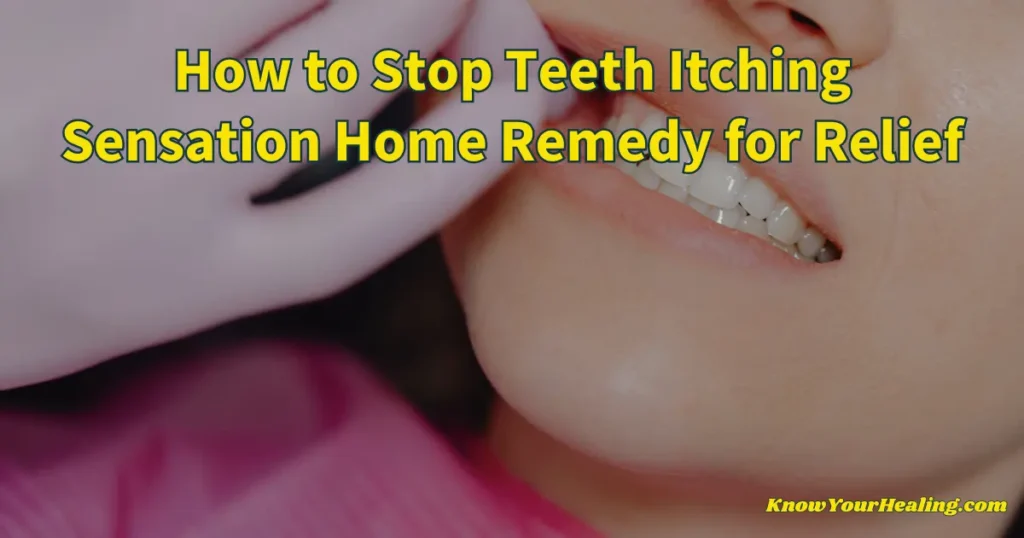Teeth itching sensation home remedy can be frustrating and uncomfortable, prompting individuals to seek quick relief.
One effective solution is a saltwater rinse, which helps reduce inflammation and is a natural antiseptic.
This post will explore a variety of home remedies, including gargling with salt water, using herbal pastes, and applying cold compresses to help you alleviate that annoying itching sensation.
Mixing a teaspoon of salt in warm water can be an easy and effective first step for those looking for natural solutions.
Many people also find relief with herbal pastes made from cloves and turmeric.
These options provide a soothing effect and can be made from items you likely have at home.
The itching sensation can stem from poor oral hygiene or other underlying causes.
Consistent dental care, such as brushing and flossing twice daily, is key to preventing these issues.
Incorporating these remedies into daily routines can address symptoms and improve overall dental health.
Understanding the Causes of Teeth Itching Sensation

The root cause of the teeth itching sensation often involves factors like plaque buildup, hormonal changes, and certain medical conditions.
Identifying these issues can guide individuals to take the best steps for relief through home remedies or professional care.
Common Medical Conditions Linked to Itchy Teeth
Various medical conditions can trigger an itchy sensation in the teeth.
For instance, oral allergy syndrome, often connected to hay fever, can lead to itching when certain raw fruits and vegetables are consumed.
Tooth sensitivity from dental procedures or tooth decay may also cause discomfort.
Viral and bacterial infections, including the first stage of gum disease, can irritate the soft tissues around the teeth, leading to an itchy feeling.
Understanding these conditions is critical to finding the appropriate treatment for relief and ensuring good oral health.
How Hormonal Changes Affect Gum Health
Hormonal fluctuations, common during pregnancy or menopause, can impact gum health and result in an itchy sensation.
These changes may increase gum sensitivity and inflammation, making gums more susceptible to plaque buildup and irritation.
Poor oral health due to hormonal shifts can lead to gingivitis, a mild gum disease that causes itching and discomfort.
Regular dental check-ups and good oral hygiene are essential to manage symptoms effectively and promote healthy gums.
The Role of Plaque Buildup in Gum Sensitivity
Plaque buildup is a sticky film of bacteria that forms on teeth.
When not removed through proper dental hygiene, it can lead to gum sensitivity and an itchy sensation.
Plaque can harden into tartar, contributing to periodontal disease, which inflames the gums and increases discomfort.
Implementing regular brushing, flossing, and rinsing with a saltwater solution can significantly reduce plaque and alleviate symptoms.
These simple things maintain the health of both teeth and gums, preventing further complications.
Effective Teeth Itching Sensation Home Remedy for Relief

The itching sensation can often result from gum irritation, plaque buildup, or dry mouth.
Utilizing home remedies such as a saltwater rinse or natural treatments can offer significant relief and help maintain good oral hygiene.
These remedies target the root cause, providing a simple and effective way to soothe the itch.
Salt Water Rinse: A Simple Solution
A salt water rinse is an excellent way to alleviate an itchy sensation in the teeth and gums.
Mixing a teaspoon of salt with a glass of warm water can help reduce gum irritation and fight off bacterial infections.
Swishing this solution around the mouth loosens food particles and lessens plaque buildup, which can cause itchy teeth.
Dental professionals often recommend this straightforward method as a preventive measure.
Regular use aids in maintaining healthy gums and is a simple addition to one’s dental care routine.
Using Coconut Oil for Gum Health
Coconut oil serves as a beneficial remedy for gum health.
Its anti-inflammatory properties are particularly effective in relieving gum sensitivity and reducing itch.
Applying a small amount on the affected area or using it for oil pulling can help eliminate harmful bacteria and reduce inflammation.
Coconut oil’s natural enzymes support good oral health by keeping gum tissues moisturized, thus preventing irritation from dryness.
This method is gentle and effective, making it a popular choice for those looking to manage itching without harsh chemicals.
The Benefits of Clove Oil for Itchy Sensation
Clove oil is known for its soothing properties, making it a top choice for itchy teeth relief.
It contains eugenol, a compound that numbs pain and reduces inflammation.
Applying clove oil with a cotton ball on the affected gums can alleviate the itchy sensation and relieve gum irritation.
Besides its soothing effect, clove oil’s natural antibacterial properties can combat bacteria contributing to itching.
This remedy is easy to apply and offers quick relief, making it an effective solution for those experiencing discomfort.
Maintaining Good Oral Hygiene for Healthy Gums

Maintaining good oral hygiene is crucial in preventing dental problems like gum recession and tooth decay.
Following essential practices can reduce symptoms such as an itchy sensation in the mouth.
Importance of Regular Dental Check-Ups
Regular dental check-ups are essential for detecting the early stages of gum disease, which, if not addressed, can lead to more serious issues like tooth loss.
These visits ensure that any plaque buildup is professionally cleaned, reducing the risk of bacterial infections and gum inflammation.
Dental professionals can also screen for signs of gum recession and guide best practices to maintain healthy gums.
Check-ups are recommended at least twice a year.
Best Practices for Daily Dental Care
Daily dental care prevents common issues like tooth decay and gum irritation.
Brushing teeth twice a day with fluoride toothpaste is the best way to keep the mouth clean.
Flossing is also crucial, removing food particles and sticky film that a toothbrush can’t reach.
Adding a saltwater rinse can soothe gum sensitivity and help with inflammation of the gums.
Staying hydrated with plenty of water produces enough saliva, prevents a dry mouth, and keeps the gum line healthy.
How to Prevent Gum Recession and Tooth Decay
Gum recession and tooth decay can result from poor dental habits, so adopting preventive measures is important.
Avoid acidic foods, which can wear away enamel and irritate gums.
Using a soft-bristled toothbrush gently protects the delicate tissue around the gum.
Routine dental check-ups and professional cleaning help minimize tartar buildup, reducing the chances of a root canal treatment or tooth extraction.
Home remedies like a saltwater rinse can alleviate minor discomfort, but professional dental care is crucial for addressing the root cause of persistent issues.
Lifestyle Changes to Alleviate Itchy Mouth Symptoms

Adopting specific lifestyle changes can significantly help reduce itchy mouth symptoms. These adjustments focus on maintaining good oral hygiene, managing dietary choices, and addressing underlying allergies or health issues.
Staying Hydrated: The Importance of Enough Saliva
Staying hydrated is essential for producing enough saliva, which helps wash away food particles and reduce the risk of plaque buildup.
A dry mouth can lead to itchy sensations and other dental problems such as tooth decay.
Drinking plenty of water, ideally eight glasses a day, keeps the mouth moist and healthy.
Chewing sugar-free gum can stimulate saliva production, protecting against bacterial infections that irritate the gums.
Avoiding Acidic Foods and Their Impact on Dental Health
Consuming acidic foods, such as citrus fruits, can weaken the enamel and harm the delicate tissue in the mouth.
Regular exposure to such foods can contribute to a similar sensation of itching and irritation around the gum line.
Avoiding acidic foods helps maintain the integrity of the teeth and prevents gum sensitivity.
Incorporating more neutral and alkaline foods, like leafy greens, supports good dental health and can lead to healthier gums.
Managing Seasonal Allergies and Oral Allergy Syndrome
Seasonal allergies can trigger oral allergy syndrome, causing itchy mouth and gum discomfort.
Managing seasonal allergies through medication or lifestyle adjustments is crucial for preventing these oral symptoms.
Keeping allergens like pollen at bay by staying indoors on high pollen days or using air filters can help.
If allergic reactions prompt itchy gums, an appropriate treatment plan guided by healthcare professionals can reduce inflammation and discomfort.
When to Seek Professional Dental Care

People experiencing itchy teeth and gum issues often try home remedies like a saltwater rinse or clove oil to relieve itchy gums. However, there are specific situations where professional dental care is essential.
Recognizing Signs of Periodontal Disease
Periodontal disease, or gum disease, can start with subtle symptoms.
Signs include redness, swelling, and bleeding in the gums.
If these symptoms occur frequently or worsen, seeking dental care is crucial.
As the disease progresses, it can lead to gum recession and tooth loss.
Regular dental check-ups help catch signs early, ensuring intervention before significant damage occurs.
Addressing plaque buildup early is key to maintaining gum health and preventing the disease from advancing into more severe stages.
Understanding the Healing Process After Dental Procedures
Dental procedures, such as tooth extractions or root canals, require careful healing.
Itching or discomfort may occur as tissues heal. This is normal but should be monitored.
If pain signals or inflammation persist, it might indicate complications.
A dentist can determine if the affected area is healing correctly or if further treatment is needed.
Proper post-procedure care, like using hydrogen peroxide or following the dentist’s advice, ensures effective recovery and prevents complications.
The Importance of Deep Cleaning for Gum Health
Deep cleaning, often recommended for those with significant plaque buildup, plays a vital role in dental health.
This procedure thoroughly cleans the gum line and tooth roots, removing tartar and debris.
Patients with gum sensitivity or persistent itchy sensations should consider professional cleaning.
It is essential for treating periodontal disease and preventing its progression.
Periodic deep cleans and good oral hygiene practices at home maintain healthy gums and overall oral health.
Final Thoughts
Teeth itching sensation can be an unpleasant experience that disrupts daily life.
Home remedies can offer relief without requiring a trip to the dentist.
Simple actions like maintaining good oral hygiene are crucial.
Brushing and flossing effectively prevent the buildup of plaque, which could lead to itching.
Rinsing with a saltwater solution is a time-tested method to soothe irritated gums and teeth.
This natural remedy can be easily prepared with items found at home.
Using an antibacterial mouthwash can support oral hygiene efforts and reduce itching.
Consider choosing a product that caters to sensitive gums.
For those experiencing irritation due to allergies, taking an over-the-counter antihistamine might help reduce symptoms.
Key Takeaways:
- Consistent oral hygiene prevents plaque buildup.
- A saltwater rinse can calm irritation.
- The use of antibacterial mouthwash is beneficial.
- Over-the-counter antihistamines may alleviate itchiness due to allergies.
These remedies are simple and effective, helping individuals experience less discomfort and improve their oral health.
Frequently Asked Questions
Understanding the causes and treatments for itchy teeth and gums can help alleviate discomfort.
Read on for remedies, potential causes, and effective treatments for itchiness in and around the mouth.
How do I stop my teeth from itching?
Maintaining good oral hygiene is crucial to stopping teeth from itching.
Brushing, flossing, and using an antibacterial mouthwash can prevent plaque buildup and reduce itching sensations.
Why do my teeth feel like they are itchy?
Teeth may feel itchy due to plaque accumulation, gum disease, or allergic reactions.
A regular oral care routine, including brushing and flossing, helps prevent such issues.
How to cure tooth sensitivity immediately?
Brushing with desensitizing toothpaste and using vanilla extract with numbing properties can help provide immediate relief from tooth sensitivity.
Avoiding hot or cold foods also helps reduce pain.
What medicine is good for itchy gums?
Over-the-counter antihistamines might relieve itchy gums caused by allergies.
It’s also beneficial to rinse with a saltwater solution to soothe irritation.
How do you calm an irritated tooth?
Avoiding triggers, such as sweet or acidic foods, and using toothpaste designed for sensitive gums can calm irritated teeth.
Applying a cold compress can also reduce any associated inflammation.
How do you get rid of an itchy mouth?
Rinsing with a warm saltwater solution can soothe an itchy mouth.
Additionally, using herbal pastes made with cloves and turmeric may provide relief.
How do you get rid of tickles in your teeth?
A tickle in the teeth can often be managed with improved oral hygiene and regular use of an antibacterial mouthwash.
Addressing any underlying dental concerns is key to preventing ongoing discomfort.
How long do itchy gums last?
The duration of itchy gums largely depends on the underlying cause.
While minor irritations may resolve in a few days with proper care, persistent symptoms should be evaluated by a dental professional for further treatment.
Why do my teeth feel tingly?
Teeth might feel tingly due to exposure to cold or sweet foods or sensitivity issues.
Using toothpaste for sensitive teeth can alleviate tingling sensations.
What is the best toothpaste for itchy gums?
A toothpaste containing fluoride and anti-inflammatory agents can be effective for itchy gums. Make sure to choose options specifically formulated for sensitive gums. Also, maintain regular dental check-ups.




